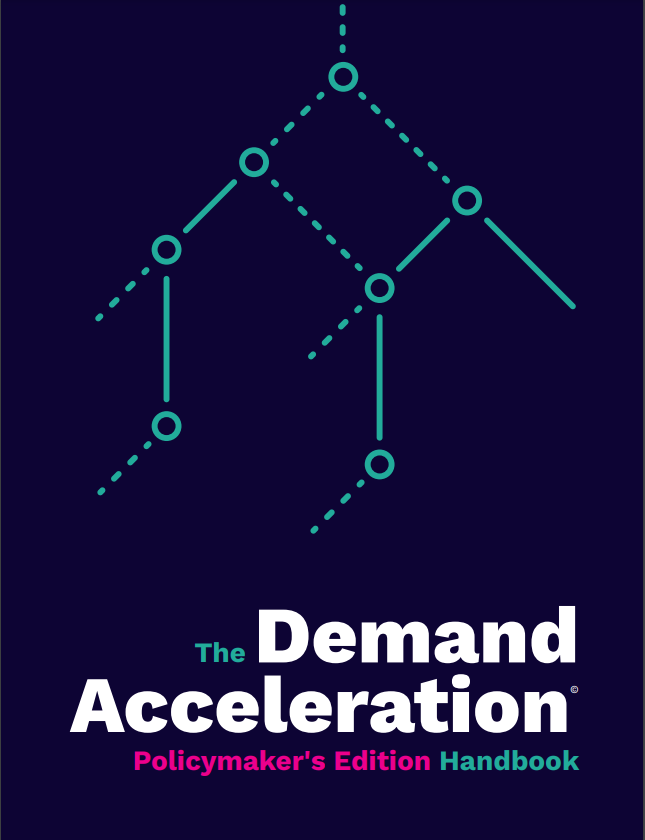Innovation is not limited by supply but by demand. Demand Acceleration is a methodology for how the public sector can drive innovation and transition with public procurement as an instrument, by accelerating the demand for sustainable solutions.
The Demand Acceleration Network has its own community where we regularly meet in breakfast meetings and other forums to discuss and exchange experiences. The community also provides access to various useful materials, such as presentations, procurement documents, etc.
Click to joinDemand Acceleration is a methodology for how the public sector can drive innovation and change with public procurement as a tool, by increasing the demand for sustainable solutions.
Public procurement is worth over 80 billion euros in Sweden alone. If only one percent could be used to drive innovation and development, it would correspond to more than twice as much as the Swedish Innovation Acency Vinnova's current budget.
Municipalities
11%
Regions
13%
Government agencies
18%
Here you can learn more about the six principles of Demand Acceleration - which are the cornerstone and theoretical foundation of the procurement methodology. From the fundamental assumption that public procurement can drive innovation, to why companies should own the intellectual property rights to the services being developed.
Procurement in the public sector requires evaluation against pre-defined criteria, while innovation involves an uncertain process without predefined specifications.
It is possible to combine procurement and innovation by using the basic principles of public procurement as guidelines for cooperation between the public customer and suppliers.
Innovation is about creating value through new or improved solutions via an explorative, experimental, and iterative process. This requires space, resources, and organizational alignment.
Innovation also demands the ability to embrace failures and learn incrementally. By taking calculated risks early on, one can minimize uncertainty and increase the chances of successfully procuring innovations.
Innovation is a process where users and solution providers collaborate, where multiple alternative suppliers should be invited instead of choosing a single one.
Those unable to meet customer needs or scale the solution in the market should gradually be eliminated. Therefore, the innovation process should allow co-creation in multiple phases to reduce risk and uncertainty.
Sketches, presentations, demonstrators, and prototypes are used to clarify needs. Requirements and solutions contribute to creating interaction and dialogue to enhance understanding during the process.
In a co-creation process, potential solutions and suppliers should be included early, and the needs formulation should be seen as a starting point of the innovation process, not as the endpoint of an extensive needs analysis.
Scalability is important at every stage of the process, from market analysis of the need to evaluating the solution's business potential and suppliers' ability to disseminate the service in the market.
The suppliers should own the intellectual assets developed during the process, which can be combined with the principle of co-creation. This also creates incentives for scaling up and developing the services.
Here you will find our manuals, which provide a more in-depth description of how the methodology can be applied in practice. Additionally, there is a shorter version, which serves as a basis for understanding Demand Acceleration from a policy perspective.

Svenska, 85 sidor.

Engelska, 62 sidor.

Engelska, 80 sidor.
jakob@aldab.se
+46 (0)70 825 90 10
Services: Process management, education, strategy, and business development
hello@mlimpact.se
+46 (0)70 928 20 72
Services: Process management, education
lina.svensberg@compare.se
+46 (0)76 137 97 68
Services: Process management, education, coaching, strategy
per.danielsson@me.com
+46 (0)70 307 24 18
Services: Legal counsel, procurement consultation
niklas.tideklev@dialogmakarna.se
+46 (0)73 925 49 60
Services: Legal counsel, process management, education, procurement consultation
mikaela.farnqvist@kista.com
+46 (0)731 58 35 08
lucas.uhlen@kista.com
+46 (0)708- 55 55 62
Services: Process management
hanna.wallin@broninnovation.se
+46 (0)76 022 41 92
Services: Process management
anna_maria_martensson@hh.se
+46 (0)72 977 37 21
Services: Process management
Karlstads kommun utgår från behoven och låter marknaden hitta lösningarna inom äldreomsorgen
DigitalWell Arena and Compare, with Jonas Matthing and Lina Svensberg from Compare (Swe)
Publicerad 31 januari 2023

Process Manager,
Demand Accceleration
+46 (0)76 137 97 68
lina.svensberg@compare.se

Process Manager, DigitalWell Arena
+46 (0)70 669 58 05
jonas.matthing@compare.se

Communications
+46 (0)73 653 62 67
anders.milde@compare.se
Sweden (GDP approx. SEK 800 million)
16%
EU (GDP approx. SEK 20,000m)
14%
EU (GDP approx. SEK 20,000m)
14%
EU (GDP approx. SEK 20,000m)
14%
Sweden (GDP approx. SEK 800 million)
16%
Vinnovas budget (approx 4Mkr)
16%

Vad skulle hända om all upphandling blev innovationsvänlig, och alla innovationsprocesser i offentlig sektor upphandlingsvänliga? I den här artikeln utreder och analyserar Lina Svensberg, innovationsledare

I dag lanserade Karlstads kommun ”Öppna Staden”. En helt ny tjänst som erbjuder en digital guide för att människor med kognitiva utmaningar mer självständigt ska

De hände mycket i DigitalWell Arenas ekosystem mellan den 12 och 13 juni. Som en del av att vi delade ut vår utmärkelse DigitalWell Award
If you have questions, input or you are you interested in joining.

The regional project DigitalWell is financed by the European Union - European Regional Development Fund. The purpose of DigitalWell is that we will together develop digital solutions for needs in welfare with the user's own abilities in focus.